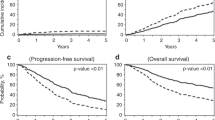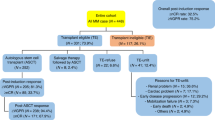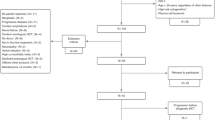Abstract
The clinical outcome of multiple myeloma is heterogeneous. Both the depth of response to induction and transplant as well as early relapse within a year are correlated with survival, but it is unclear which factor is most relevant in Southeast Asian patients with multiple myeloma. We retrospectively analyzed outcomes of 215 patients who were treated with upfront autologous transplant in Singapore between 2000 and 2014. In patients who received novel agent (NA)-based induction, achieving only partial response (PR) post-induction was associated with poorer OS (HR 1.95, P=0.047) and PFS (HR 2.9, P<0.001), while achieving only PR post-transplant was strongly correlated with both OS (HR 3.3, P=0.001) and PFS (HR 7.6, P<0.001), compared with patients who achieved very good partial response (VGPR) or better. Early relapse was detected in 18% of all patients, although nearly half had initially achieved VGPR or better post-transplant. Early relapse after NA-based induction led to significantly shorter OS (median 22 months vs not reached, P<0.001), and was strongly associated with OS (HR 13.7, P<0.001). The impact of suboptimal post-transplant response and early relapse on survival may be more important than pretransplant factors, such as International Staging System or cytogenetics, and should be considered in risk stratification systems to rationalize therapy.
This is a preview of subscription content, access via your institution
Access options
Subscribe to this journal
Receive 12 print issues and online access
$259.00 per year
only $21.58 per issue
Buy this article
- Purchase on Springer Link
- Instant access to full article PDF
Prices may be subject to local taxes which are calculated during checkout

Similar content being viewed by others
References
Kim K, Lee JH, Kim JS, Min CK, Yoon SS, Shimizu K et al. Clinical profiles of multiple myeloma in Asia—an Asian Myeloma Network Study. Am J Hematol 2014; 89: 751–756.
Sonneveld P, Goldschmidt H, Rosinol L, Blade J, Lahuerta JJ, Cavo M et al. Bortezomib-based versus nonbortezomib-based induction treatment before autologous stem-cell transplantation in patients with previously untreated multiple myeloma: a meta-analysis of phase III randomized, controlled trials. J Clin Oncol 2013; 31: 3279–3287.
Tan D, Kim K, Kim JS, Eom HS, Teoh G, Ong KH et al. The impact of upfront versus sequential use of bortezomib among patients with newly diagnosed multiple myeloma (MM): a joint analysis of the Singapore MM Study Group and the Korean MM Working Party for the Asian Myeloma Network. Leuk Res 2013; 37: 1070–1076.
Kim JS, Kim K, Cheong JW, Min YH, Suh C, Kim H et al. Complete remission status before autologous stem cell transplantation is an important prognostic factor in patients with multiple myeloma undergoing upfront single autologous transplantation. Biol Blood Marrow Transplant 2009; 15: 463–470.
Lahuerta JJ, Mateos MV, Martinez-Lopez J, Rosinol L, Sureda A, de la Rubia J et al. Influence of pre- and post-transplantation responses on outcome of patients with multiple myeloma: sequential improvement of response and achievement of complete response are associated with longer survival. J Clin Oncol 2008; 26: 5775–5782.
Lee SE, Yoon JH, Shin SH, Cho BS, Eom KS, Kim YJ et al. Impact of failed response to novel agent induction in autologous stem cell transplantation for multiple myeloma. Ann Hematol 2014; 93: 627–634.
Gertz MA, Kumar S, Lacy MQ, Dispenzieri A, Dingli D, Hayman SR et al. Stem cell transplantation in multiple myeloma: impact of response failure with thalidomide or lenalidomide induction. Blood 2010; 115: 2348–2353.
Kumar S, Mahmood ST, Lacy MQ, Dispenzieri A, Hayman SR, Buadi FK et al. Impact of early relapse after auto-SCT for multiple myeloma. Bone Marrow Transplant 2008; 42: 413–420.
Jimenez-Zepeda VH, Reece DE, Trudel S, Chen C, Tiedemann R, Kukreti V . Early relapse after single auto-SCT for multiple myeloma is a major predictor of survival in the era of novel agents. Bone Marrow Transplant 2015; 50: 204–208.
Hoering A, Crowley J, Shaughnessy JD Jr, Hollmig K, Alsayed Y, Szymonifka J et al. Complete remission in multiple myeloma examined as time-dependent variable in terms of both onset and duration in Total Therapy protocols. Blood 2009; 114: 1299–1305.
Kyle RA, Rajkumar SV . Criteria for diagnosis, staging, risk stratification and response assessment of multiple myeloma. Leukemia 2009; 23: 3–9.
Blade J, Samson D, Reece D, Apperley J, Bjorkstrand B, Gahrton G et al. Criteria for evaluating disease response and progression in patients with multiple myeloma treated by high-dose therapy and haemopoietic stem cell transplantation. Myeloma Subcommittee of the EBMT. European Group for Blood and Marrow Transplant. Br J Haematol 1998; 102: 1115–1123.
Fonseca R, Bergsagel PL, Drach J, Shaughnessy J, Gutierrez N, Stewart AK et al. International Myeloma Working Group molecular classification of multiple myeloma: spotlight review. Leukemia 2009; 23: 2210–2221.
Moreau P, Attal M, Pegourie B, Planche L, Hulin C, Facon T et al. Achievement of VGPR to induction therapy is an important prognostic factor for longer PFS in the IFM 2005-01 trial. Blood 2011; 117: 3041–3044.
Vij R, Kumar S, Zhang MJ, Zhong X, Huang J, Dispenzieri A et al. Impact of pretransplant therapy and depth of disease response before autologous transplantation for multiple myeloma. Biol Blood Marrow Transplant 2015; 21: 335–341.
Takamatsu H, Honda S, Miyamoto T, Yokoyama K, Hagiwara S, Ito T et al. Changing trends in prognostic factors for patients with multiple myeloma after autologous stem cell transplantation during the immunomodulator drug/proteasome inhibitor era. Cancer Sci 2015; 106: 179–185.
Palumbo A, Avet-Loiseau H, Oliva S, Lokhorst HM, Goldschmidt H, Rosinol L et al. Revised International Staging System for Multiple Myeloma: a report from International Myeloma Working Group. J Clin Oncol 2015; 33: 2863–2869.
Paiva B, Gutierrez NC, Rosinol L, Vidriales MB, Montalban MA, Martinez-Lopez J et al. High-risk cytogenetics and persistent minimal residual disease by multiparameter flow cytometry predict unsustained complete response after autologous stem cell transplantation in multiple myeloma. Blood 2012; 119: 687–691.
Avet-Loiseau H, Attal M, Campion L, Caillot D, Hulin C, Marit G et al. Long-term analysis of the IFM 99 trials for myeloma: cytogenetic abnormalities [t(4;14), del(17p), 1q gains] play a major role in defining long-term survival. J Clin Oncol 2012; 30: 1949–1952.
Author information
Authors and Affiliations
Corresponding author
Ethics declarations
Competing interests
The authors declare no conflict of interest.
Rights and permissions
About this article
Cite this article
Ong, S., de Mel, S., Chen, Y. et al. Early relapse post autologous transplant is a stronger predictor of survival compared with pretreatment patient factors in the novel agent era: analysis of the Singapore Multiple Myeloma Working Group. Bone Marrow Transplant 51, 933–937 (2016). https://doi.org/10.1038/bmt.2016.43
Received:
Revised:
Accepted:
Published:
Issue Date:
DOI: https://doi.org/10.1038/bmt.2016.43
This article is cited by
-
Mass cytometry dissects T cell heterogeneity in the immune tumor microenvironment of common dysproteinemias at diagnosis and after first line therapies
Blood Cancer Journal (2019)
-
Plasma cell proliferative index post-transplant is a powerful predictor of prognosis in myeloma patients failing to achieve a complete response
Bone Marrow Transplantation (2019)



